Making sense of the markets this week: June 11, 2023
Interest rates are up, volatility is down; the stock market isn’t a blackjack table; dollar stores are winning, Roots and NWC not so much.
Advertisement
Interest rates are up, volatility is down; the stock market isn’t a blackjack table; dollar stores are winning, Roots and NWC not so much.

Kyle Prevost, editor of Million Dollar Journey and founder of the Canadian Financial Summit, shares financial headlines and offers context for Canadian investors.
On Wednesday, the Bank of Canada (BoC) announced it was raising the key interest rate from 4.5% to 4.75%. Many market-watchers hoped our central bank would pause a little longer on further rate rate hikes. Given the increased inflation and surging GDP news of last week, the BoC clearly thought it had more room to tighten monetary policy.
Now, there’s speculation the BoC could continue to hike rates over the next few months if the leading economic indicators remain “too good.” And, talk of possible rate cuts near the end of 2023 has died down considerably.
Canadian banks were quick to react to the news, with all the major players raising their prime lending rates to a relatively painful 6.95%. The speed at which variable-rate mortgage holders have watched their payments go up is unprecedented in recent memory.
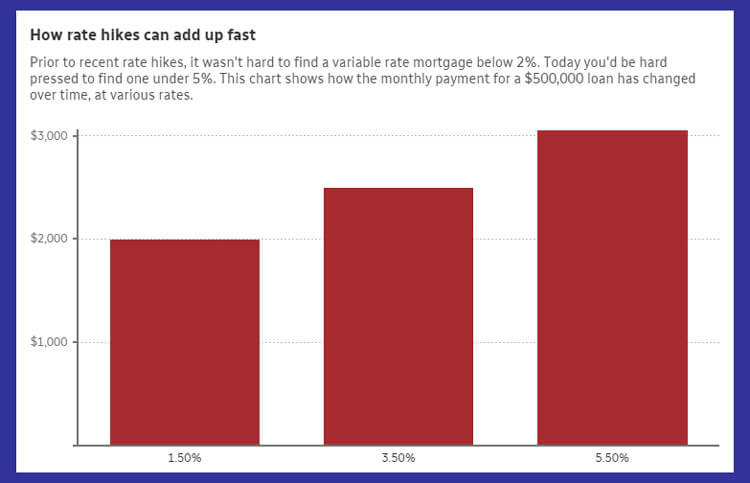
With the interest-rate screws tightening so quickly, we think this will inevitably lead to many negative spin-off effects as household budgets feel the pain, and reduce spending in other areas. If governments continue to hike rates this aggressively in their pursuit of lower inflation, there is no doubt it’s going to restrict spending in other areas. The political realities of those trade-offs are definitely going to result in heated political discussions concerning whether 2% inflation rates are worth the increased strain.
Last week’s Lulu versus Dollar General earnings showdown revealed some interesting trends in U.S. retail. Those consumer habits don’t appear to have made the trip north of the border, where dollar-store earnings were much healthier than those of Canada’s premier outdoor lifestyle brands. All earnings numbers are in CAD.
Canadian dollar-store king Dollarama reported a slight earnings beat this week, and the share prices were up slightly as a result.
On the other hand, both Roots and the Northwest Company had rough weeks. Roots was down 2% after announcing earnings on Thursday. Management pointed to decreased sweatpants sales as the culprit for disappearing profit. NWC shares plummeted 10.81% on Wednesday after their earnings announcement, as the food and merchandise retailer cited increased shipping costs and “changes in the sales blend” for the lower profit numbers.
An alternative way to invest in the broader world of Canadian retailers could be the iShares S&P/TSX Capped Consumer Staples Index ETF (XST). Just understand that it’s heavily weighted toward convenience store giant Alimentation Couche Tard (ATX/TSX) and Canada’s grocery empires. For more information, check out Investing in Canadian retail stocks at MillionDollarJourney.ca.
If you’re going to bet on something, bet on Ben Carlson for a good perspective. He wrote an excellent oped titled, “The Stock Market is Not a Casino.”
There are Canadians, who don’t really understand the stock market and like to compare it to gambling. True, some investors treat short-term speculation like a blackjack bet. But actual long-term stock-market investing consists of purchasing pieces of companies and holding, so they can then watch those companies conduct their businesses and earn profits. That’s not like any card game we’ve played.
This simple reality is true whether you live in the intensely capitalist wealth-creator that is the U.S.A., or in the rest of the world, including Canada.
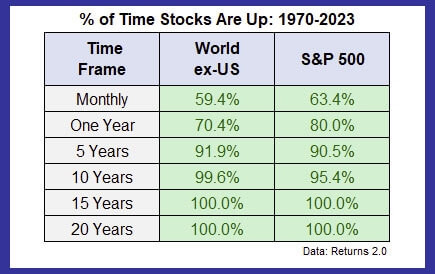
We found it very interesting that international stocks were actually up at a higher percentage than that of U.S. stocks, over five- and 10-year periods. Of course, the U.S. market’s highs generally are better than those of other countries—but still, a win for diversifying!
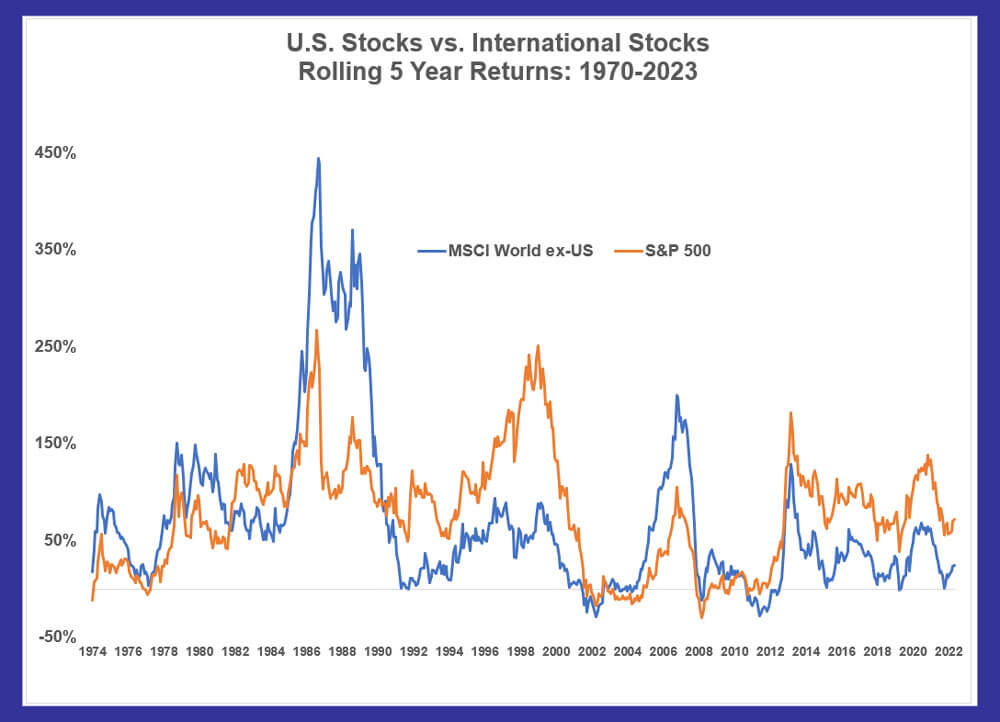
Furthermore, as Carlson points out in his post, the house doesn’t always win. “The house,” in this case, are the big investment companies. Their ability to soak up profits from investor activity has gone way down over the last decade due to the break-out of discount brokerages.
Historically, investing in a broad diversified mix of profitable companies from around the world has been the way to grow money, and our “bet” is that it could continue that way for a long time to come.
Given all the headlines about debt ceilings, war, climate change, food shortages and inflation, Canadians might reasonably have expected the 2023 stock market to look, so far, pretty volatile.
The reality is: Despite the many negative factors, large companies have continued to make a lot of money, and the S&P 500 index has been remarkably calm.
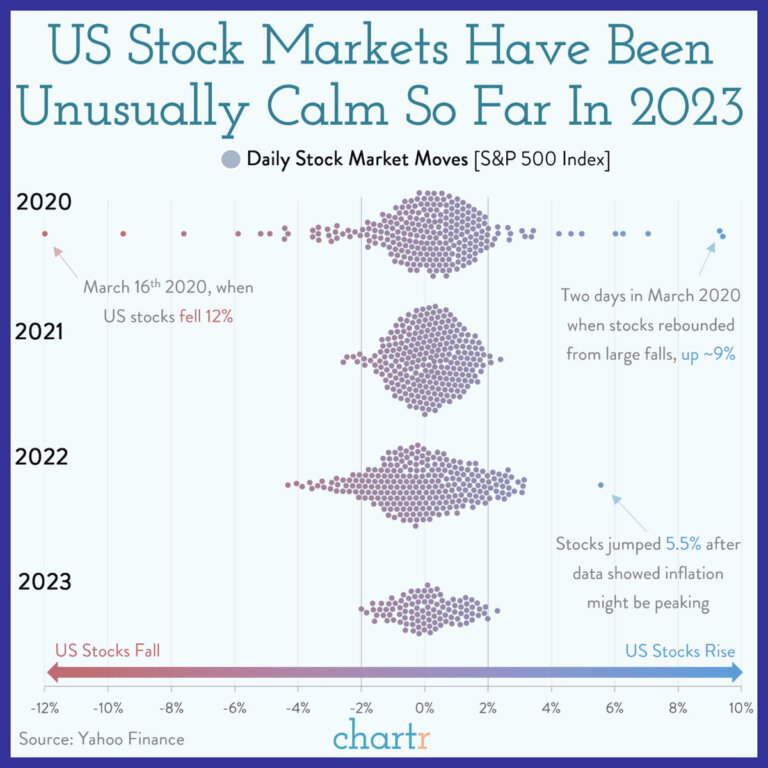
The above chart illustrates the tight range of outcomes so far this year, compared with the last few years. In 2023, the worst day was February 21, when the market fell 2%, and the best day was January 6 when the market was up 2.28%.
A popular shorthand metric for market volatility is the Chicago Board Options Exchange’s CBOE Volatility Index ETF. It is better known by its ticker symbol “The VIX.” The more up and down the market is, the higher the returns for The VIX.
As we can see below, volatility has been quite low this year, leading to a lot of disappointed VIX investors.
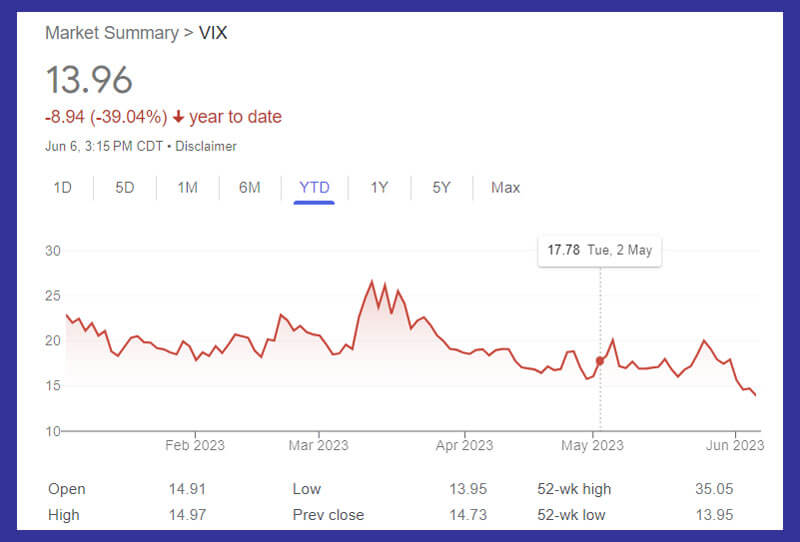
As always, when looking at the markets through the lens of your personal portfolio, it’s important to remember that in the long term, the optimists tend to win. They just don’t buy newspapers—or click on reddit and TikTok posts, for that matter—like pessimists do.
Share this article Share on Facebook Share on Twitter Share on Linkedin Share on Reddit Share on Email